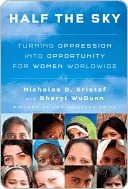More on this book
Community
Kindle Notes & Highlights
just the equivalent of “No. 2 sister” or “No. 4 sister.” Or, perhaps even less dignified, girls might be named Laidi or Yindi or Zhaodi, all variations of “Bring a younger brother.” Girls were rarely educated, often sold, and vast numbers ended up in the brothels of Shanghai. So was it cultural imperialism for Westerners to criticize foot-binding and female infanticide? Perhaps. But it was also the right thing to do. If we believe firmly in certain values, such as the equality of all human beings regardless of color or gender, then we should not be afraid to stand up for them; it would be
...more
or cultures. One lesson of China is that we need not accept that discrimination is an intractable element of any society. If culture were immutable, China would still be impoverished and ...
This highlight has been truncated due to consecutive passage length restrictions.
But in Sudan, Ethiopia, and Somalia, it is common to see the most extreme kind, in which the entire genital area is “cleaned up” by snipping away the clitoris, labia, and all external genitalia. This creates a large raw wound, and the vaginal opening is then typically sewn up with a wild thistle (leaving a small opening for menstrual blood), with the legs tied
together so that the wound can heal. This is called infibulation, and when the woman is married, her husband or a midwife uses a knife to reopen the sealed part so that she can have intercourse.
Molly Melching,
“We did a segment on women’s rights for a while, and that just built opposition,” Molly said. “Some of the men closed our centers, they were so angry. So we sat down and rewrote the whole module and did ‘people’s rights’ instead—democracy and people’s rights. Then we had the men behind us, too. The men just want to be included; they don’t want to be seen as the enemy.”
Tostan, Kashf, Grameen, the CARE project in Burundi, BRAC, the Self Employed Women’s Association in India, Apne Aap. The common thread is that they are grassroots projects with local ownership, sometimes resembling social or religious movements more than traditional aid projects.
In the same way, the challenge today is to prod the world to face up to women locked in brothels and teenage girls with fistulas curled up on the floor of isolated huts.
because if the international effort is dubbed a “women’s issue,” then it will already have failed.
influence. In the early 1780s, slavery was an unquestioned part of the global landscape—and then, astonishingly, within a decade, slavery was at the top of the British national agenda. The tide turned, and Britain banned the slave trade in 1807 and in 1833 became one of the first nations to emancipate its own slaves.
The British navy led the way in trying to suppress the slave trade,
cumulatively amounting to more than an entire year’s GNP for Great Britain (for the United States today, it would be the equivalent of sacrificing more than $14 trillion), a significant and sustained sacrifice in the British standard of living. It was a heroic example of a nation placing its values above its interests.
As Sir John Templeton said, “Self-improvement comes mainly from trying to help others.”


